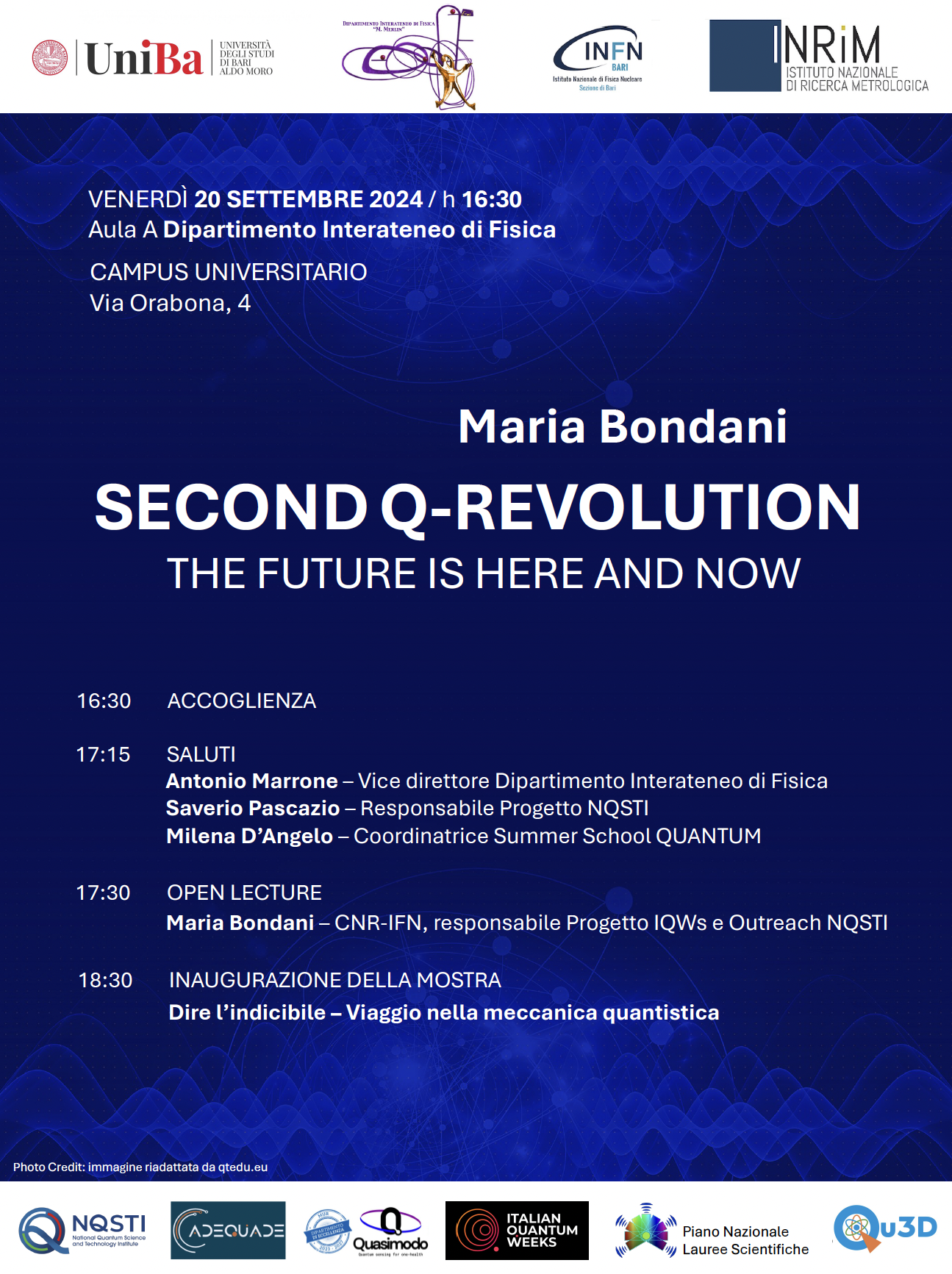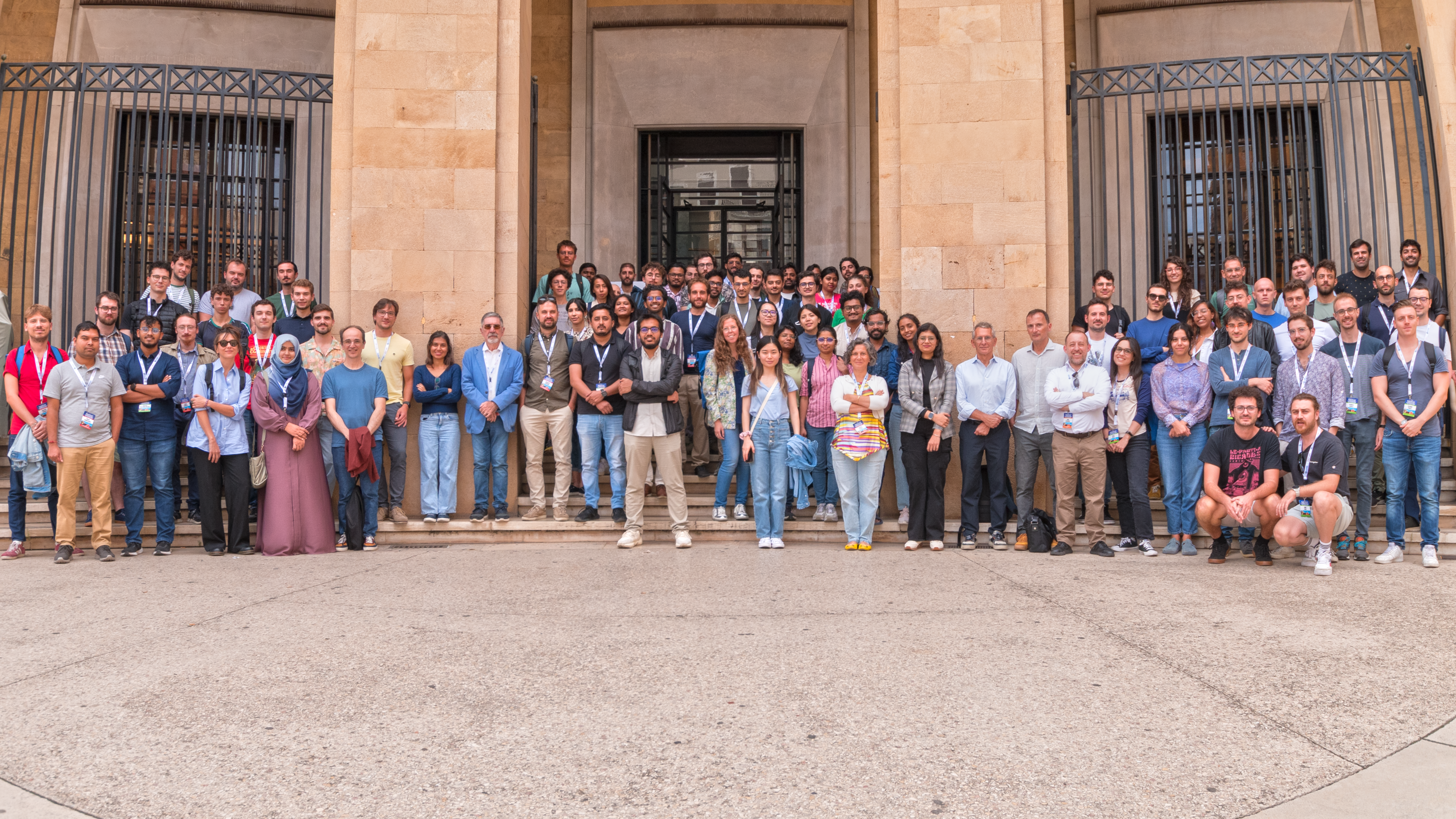Quantum 2024 - Summer School on Quantum Science and Technologies
Centro Polifunzionale Studenti, Università degli Studi di Bari (Bari, Italy)

The School is organized by Università degli Studi di Bari Aldo Moro (UniBA), Istituto Nazionale di Ricerca Metrologica (INRiM) and INFN Sezione di Bari, in synergy with the Quantum Workshops held every two years in Turin.
The Quantum 2024 Summer School is oriented to PhD students, Master students and young researchers, and aims to provide a privileged vision of quantum science and technologies, from quantum imaging and metrology to quantum communication, computing, and simulation, with both a theoretical and an experimental perspective.
The second edition of the Summer School is part of the Physics Department Excellence Project "Quantum Sensing and Modelin for One Health" (QUASIMODO), financed by the Italian Ministry of University and Research (MUR), and of the PNRR-MUR project "National Quantum Science and Technology Institute" (NQSTI, PE_00000023).
The School is dedicated to prof. Franco Selleri, who has started the research on foundations of quantum mechanics in the Bari Physics Department.
............................................................................................................................................
Partners:
Università degli Studi di Bari Aldo Moro
Istituto Nazionale di Fisica Nucleare (INFN) - Sezione di Bari
Istituto Nazionale di Ricerca Metrologica (INRiM)
Partner Projects:
NQSTI - National Quantum Science and Technology Institute
ADEQUADE - Advanced, disruptive and emerging quantum technologies for defence
Quasimodo - Quantum Sensing and Modeling for One-Health
Scientific Committee:
Milena D'Angelo, Saverio Pascazio (UniBA and INFN), Marco Genovese, Ivano Ruo Berchera (INRiM), Roberta Zambrini (IFISC, UIB-CSIC)
Organizing Committee:
Paolo Facchi, Augusto Garuccio, Francesco Pepe, Giuseppe Magnifico, Giovanni Gramegna, Gianvito Lucivero, Maria Maffei, Gianlorenzo Massaro, Nigam Samantaray, Domenico Pomarico, Davide Giannella, Sergio De Gioia, Giuseppe Lerario (UniBA and INFN), Cosmo Lupo, Giovanni Scala (Politecnico di Bari and INFN), Alessio Avella, Alice Meda (INRiM)
Supported by:
INFN Sezione di Torino, Planetek Italia, Thales Alenia Space Italia S.p.A., Multiverse Computing, European Space Agency, Ephos, Welinq, QTI Quantum Telecommunications Italy, Micro Photon Devices.

............................................................................................................................................
Program at a glance

* Speakers for QT at work: Michael Doser (CERN), Alessandro Sebastianelli (ESA), Ivo P. Degiovanni (INRiM)
** Camera di Commercio, Sala Ambrosi, Corso Cavour, 2, Bari
*** Dipartimento Interateneo di Fisica, Bus transportation available (registration required): departure at 14:00 (one way only)
Speakers for Quantum @ Bari: M. D'Angelo, V.G. Lucivero, G. Magnifico, G. Massaro, F.V. Pepe (UniBA & INFN); C. Lupo (PoliBA & INFN)
**** Hotel delle Nazioni, Lungomare Nazario Sauro, 7, Bari


...........................................................................................................................................
SUMMER SCHOOL EVALUATION
We look forward to collect participants' opinion about the attended summer school in Bari.
https://docs.google.com/forms/d/1G356s62Dp3sUn1UqkyI20QbdfYX5WJC-UVRUQnmYyu4/edit
...........................................................................................................................................
GROUP PICTURE

